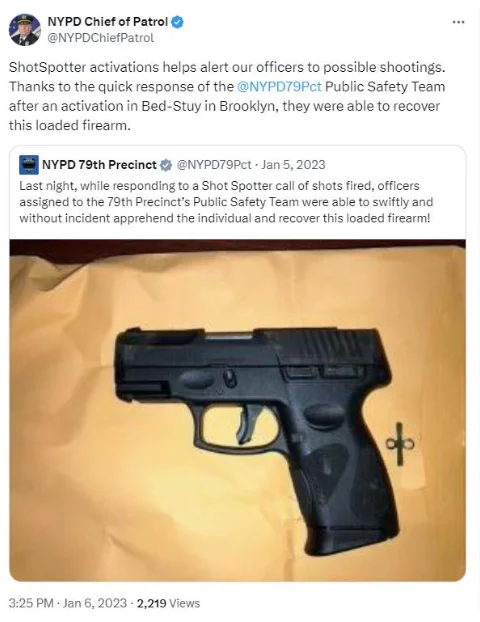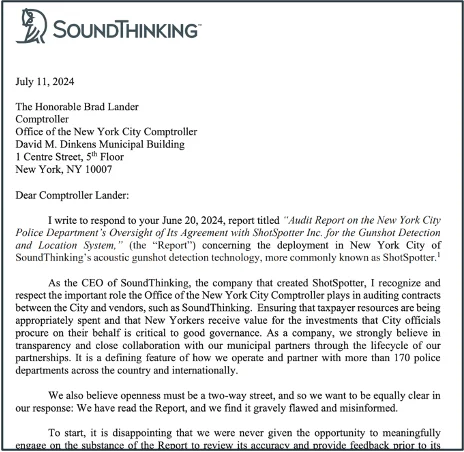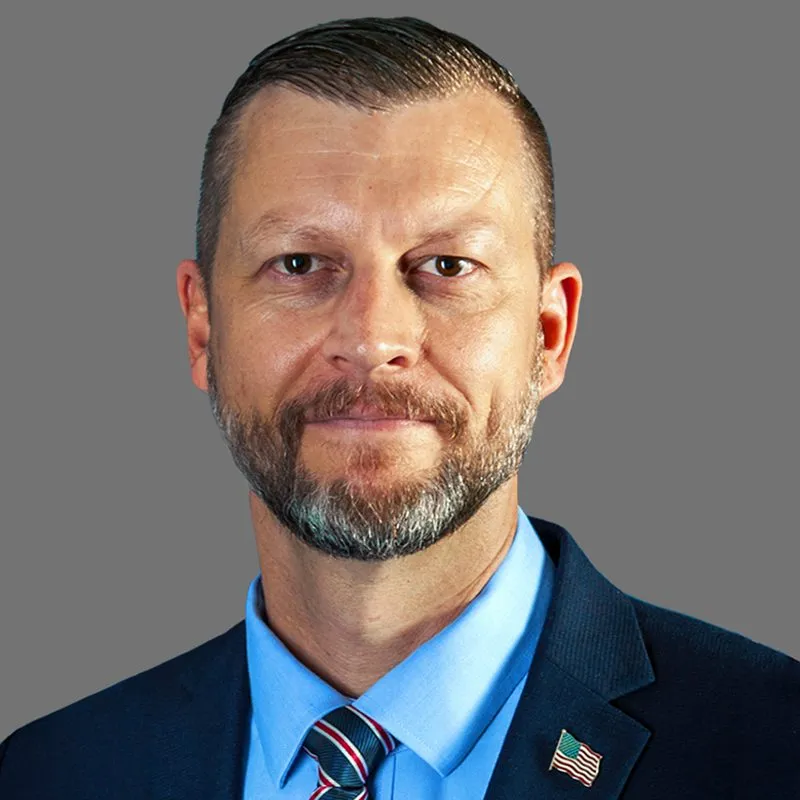By Tom Chittum, SVP of Forensic Services at SoundThinking
In the early morning hours of May 28, 2021, a ShotSpotter alert summoned NYPD to the scene of a shooting in New York City. Once there, they learned a man had been shot and killed. The killer had fled the scene but NYPD launched an investigation and later arrested Jermaine Shaw for the murder.
At Shaw’s trial, prosecutors called an expert witness from SoundThinking (parent company of ShotSpotter) to testify about ShotSpotter’s forensic evidence. Shaw was convicted of murder and a weapons offense and was sentenced to 22 years in prison. The prosecutor later said the ShotSpotter evidence was “key” in securing the conviction.
This story highlights the two primary ways ShotSpotter helps police. First, it alerts them almost immediately to the location of the sound of gunfire. With this information, they can respond quickly and precisely to the scene, to find and aid gunshot victims, initiate investigations, collect evidence, seize illegal firearms, and arrest offenders.
Second, it can also serve as powerful evidence in court, helping hold violent criminals like Jermaine Shaw accountable. For instance, it may help establish the reasonable suspicion police need to conduct an investigative detention or pat down. Sometimes it is used to fix the precise location, or timing, or number of rounds fired in a shooting. Sometimes it simply provides compelling audio of the actual shooting events, so jurors can hear for themselves the criminal gunfire.
It is this evidentiary value that makes a recent report by the Brooklyn Defender Services (BDS) so suspect. BDS is not a news outlet or an academic institution, of course. It is a legal aid organization, dedicated to defending people accused of committing crimes.
While defense attorneys play a vital role in protecting the constitutional rights of accused individuals, and they are important to the credibility, integrity, and balance of our criminal justice system overall, they are not neutral. Rather, they are zealous advocates for criminal defendants.
That’s why the BDS report essentially repeats the same misleading claims made earlier this year by NYC Comptroller—and progressive activist—Brad Lander, shortly before announcing his mayoral aspirations. SoundThinking responded to that report by providing extensive data that sets the record straight and corrects the faulty assumptions that both reports entirely rest upon.
And just as it did to Lander’s report, NYPD also responded to the BDS report, calling ShotSpotter an “integral tool in the NYPD’s mission of addressing gun violence and keeping the public safe.”
Despite the large data set the BDS report touts to try to bolster its claims, its fundamental flaw is in assuming that when police do not immediately find physical evidence of a shooting after responding to a ShotSpotter alert, that no shooting occurred. That is not true, of course.
Thankfully, many shootings do not result in wounded victims. Sometimes when victims are shot, they were also engaged in criminal activity and do not report it to police or seek medical attention. Witnesses often leave the scene, not wanting to ‘get involved.’ And other physical evidence—like the casings ejected by pistols—can be hard to locate.
We even know that sometimes offenders, who know the incriminating nature of such evidence and how technology can connect them to other crime scenes, will collect those casings before fleeing. And, of course, many firearms do not eject casings at all. Boston police, for instance, report that about 10% of all firearms they seize are revolvers, which do not automatically eject casings. Simply stated: physical evidence of a shooting can be hard to find.
That said, research has shown that law enforcement responding to a ShotSpotter alert are 3X more likely to collect forensic evidence than when responding to a 911 call. The reason for this is both speed and precision – police learn about more shootings, are getting to the scenes quickly, and they are searching a much more confined area.

The BDS report’s focus on percentages also conceals the fact that despite all the challenges in locating physical evidence, ShotSpotter alerts still lead NYPD to thousands of crime scenes where they find victims, seize evidence…and arrest offenders.
Which returns us to the fundamental reason why BDS wrote this report. They hope to use these misleading claims to strengthen their legal defense of people accused of crimes. We know this because many defense attorneys have tried this tactic.
The courts see through them though. Courts across the country—including right there in Brooklyn—routinely admit ShotSpotter evidence, where it helps hold offenders accountable. In fact, SoundThinking employees have testified in more than 350 cases, in 25 states.
So, despite what misleading critics like Brooklyn Defender Services would have you believe, SoundThinking plays an important role in helping aid the wounded, find justice for victims and their families, reassure communities plagued by gun violence, and help police and prosecutors hold criminals accountable. We are proud of that.


